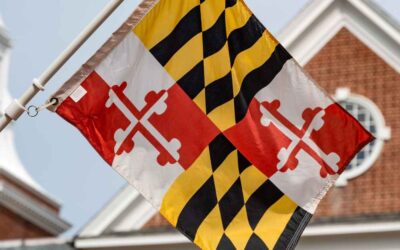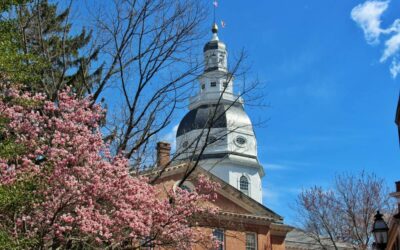After two years of uncertainty and complications due to COVID-19, the first semi-normal session since the onset of the pandemic came to a close at midnight on Monday, April 11th. In a session that began virtually and ended in hybrid-form, the Maryland General Assembly passed an unprecedented $61 billion budget which included $1.86 billion in tax relief for Maryland families; created the Maryland Paid Family Leave insurance program; tackled abortion care access, recreational marijuana, and public safety; and approved a sweeping climate change bill expected to steer the state to a carbon neutral existence by the year 2045. The following are highlights of the Maryland Legislature’s accomplishments during the 2022 Legislative Session:
Budget
The legislature passed a $61 billion operating budget made possible by higher-than-expected tax revenues and federal stimulus funds. The Fiscal Year (FY) 2023 Budget takes into account a gas tax suspension; retirement tax credit; and expands the hometown hero tax exemption which benefits retired law enforcement, correctional officers, and fire and emergency personnel. It also allows for a state-level expansion of the Federal Work Opportunity Tax Credit which provides a tax credit to employers who hire workers who historically have trouble finding work. The spending plan steers $800 million to education reform and $21 million to help launch the family leave insurance program. The budget, which goes into effect July 1st, is an increase of 10.5% from the current year and includes a $211 million surplus and maintains a $2.4 billion Rainy Day Fund.
Tax Relief
Governor Hogan, in conjunction with Legislative leadership, negotiated a deal to give Maryland taxpayers $1.86 billion in tax relief over the next five years. One of the main initiatives in the plan is a reduction on income tax for Maryland residents over the age of 65. The tax benefit would be restricted to individuals who earn up $100,000 per year or couples who bring in up to $150,000 per year in retirement income. The relief comes in the form of a tax credit that is limited to $1,000 for individuals and $1,750 for a couple.
The other piece of the tax relief package is an exemption from sales tax for personal items, medical devices, and child care products including diapers, car seats, baby bottles, dental hygiene products, thermometers, pulse oximeters and medical-grade face masks. These exemptions, defined as ‘family budget boosters’, are intended to help families and individuals who are still struggling to put food on the table and afford basic necessities two years after the pandemic negatively affected many of their livelihoods.
Maryland Paid Family Leave
The bill creates an insurance pool that is administered by the Department of Labor and funded by contributions from both employers and employees. Businesses with less than 15 employees would be exempt from making contributions. The Department of Labor has been tasked with creating the regulatory framework around how the program will operate.
This mandate was seen by the minority party to be a tax on employees in the state given that they will be forced to contribute a portion of their wages to the insurance fund. The amount of contribution was not determined in the language and will be decided on at a future time. For that reason, Governor Hogan vetoed the bill, but legislators overrode the veto just before the end of session.
Ghost Guns
In an effort to fight the violent gun crimes that proliferate the state, the legislature passed a bill that would prohibit the possession of ghost guns beginning March 1, 2023. Ghost guns are off-the-records guns that you may buy online. They arrive in pieces, ready to be assembled and do not have a serial number that would help to track them. Violations to this new law could be penalized with a fine of up to $10,000 and/or two years in prison. Governor Hogan allowed the ghost gun ban to become law without his signature.
Adult-Use Marijuana
The 2022 Legislative Session saw the passage of two bills regarding adult recreational use of marijuana. The first would require a referendum be put on the 2022 ballot to allow Marylanders to determine whether they would like to legalize the usage of marijuana for adult recreational use here in the state. If voted positively in the 2022 General Election, the law will allow individuals who are 21 years or older to possess and use certain quantities of marijuana for reasons other than medical.
The second bill, SB 833, fell short of putting the regulatory framework for a recreational cannabis industry into place, as the House initially wanted, but would legalize possession of up to 1.5 ounces and would lower the penalty on possession of up to 2.5 ounces to a civil citation. The legislation makes changes to the criminal law and triggers automatic expungements for those with previous simple possession convictions.
Climate Solutions Now Act
Legislators approved a bill that would require the state to achieve carbon neutral emissions by 2045, primarily through requiring large buildings (over 35,000 sq. ft.) to reduce their carbon footprint over the next ten years. The final bill excluded restaurants and other food service facilities from those required to meet these conditions as they continue to rebuild after devastating losses during the pandemic. The bill also includes incentives for local school districts to build net-zero school buildings other than requiring that they too meet the ambitious greenhouse gas reduction goal.
Governor Hogan allowed the Climate Solutions Now Act to become law without his signature.
Abortion Care Access Act
Senator Delores Kelley, the outgoing chair of the Senate Finance Committee, sponsored a bill that would allow nurse practitioners, nurse midwives, and physician assistants to provide abortion services to patients. The bill also allocates $3.5 million dollars to fund training for those individuals.
Additionally, the bill will would make coverage of abortion care under the state’s Medicaid plan permanent and require that most private insurance providers cover the services as well without cost-sharing or deductibles.
A separate bill that would have included abortion rights in the Maryland State Constitution failed in the waning days of session.
Governor Hogan vetoed the legislation because he believes that allowing non-physicians to perform abortion procedures may endanger the lives of women. Lawmakers disagreed with the Governor and voted over the weekend to override the veto, passing the Abortion Care Access Act into law, and taking effect on July 1st.
Redistricting
The Maryland Constitution requires that new Congressional and Legislative maps be drawn every ten years based on demographics collected during the decennial census. The criteria for the new district lines are compactness, contiguity, and preserving of political subdivisions, and they are voted on by the Maryland General Assembly before going into effect. Various legal challenges were filed by the minority party on the constitutional fortitude of both the Congressional and Legislative maps. On March 25th, the presiding judge tossed out the Congressional plan that was passed during a special session of the legislature in December 2021 for “extreme partisan gerrymandering.” The Legislature was then given five days to redraw and submit congressional maps back to the court. Legislative leadership worked throughout the weekend to develop new plans and to send them to the Governor’s desk for his signature by the deadline. On April 4th, Governor Hogan came to an agreement with legislative leaders in which he agreed to sign into law the newly drawn Congressional maps in exchange for withdrawing their appeal of the lower court’s ruling.
The special magistrate assigned to advise the Court of Appeals on the constitutionality of the legislative maps has recommended that the courts reject all cases challenging them, however, no ruling has been released as of yet.




